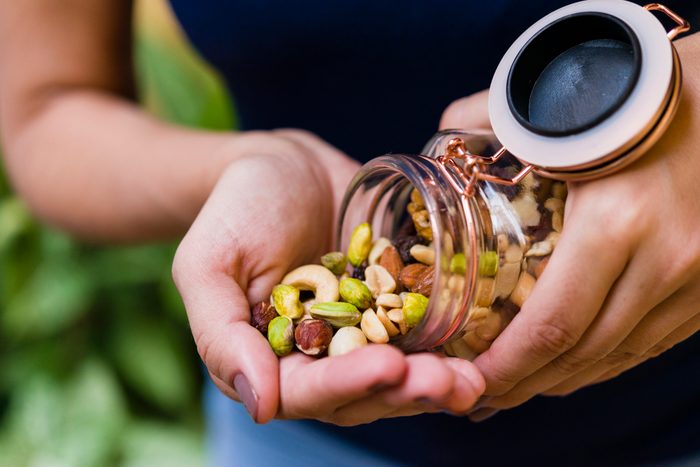
We’ve all been there: your system seems to slow down and turn a little uncomfy when you’re on vacation or staying over at your new significant other’s place. But if it’s been days since you’ve been able to have a bowel movement, this could be constipation—something that shouldn’t be ignored.
“Constipation most often refers to infrequent stools, or fewer than three bowel movements per week,” explains Simon Matthews, a Chicago-based gastroenterologist and advisory board member to Vivante Health, an innovative health technology company helping individuals who suffer from chronic digestive conditions. Dr. Matthews adds that the definition of constipation can also include “the experience of straining during defecation, the sensation of incomplete evacuation or blockage … or the presence of lumpy or hard stool.”
If these types of symptoms continue long enough, constipation can result in bloating, discomfort, and pain. To avoid that, here are some of the most common constipation causes.
Here’s How Often You Should Have a Bowel Movement, Says a Gastroenterologist

Consuming lots of processed foods
Do packaged and processed foods make up a big part of your diet? This could be causing your constipation. “White bread, processed white pasta, any processed food, and processed grain products that are limited in their fiber content will typically cause constipation when consumed in high quantities,” explains Jill Carnahan, MD, a functional medicine specialist based in Louisville, CO. “Deficiency in some nutrients, like magnesium and minerals, are also to blame, as they’re needed for bowel motility.”

Change in location
If you’re traveling or spending time in an unfamiliar location (therefore not sleeping in your bed or using your own familiar, beloved bathroom), this can affect your potty patterns. “Being uncomfortable in new surroundings may lead to an intentional or unintentional decreased ability to relax the muscles used in defecation,” explains Dr. Matthews. “Ignoring or stifling the urge to go to the bathroom over time can disrupt the normal set of voluntary and involuntary coordinated actions needed to complete a bowel movement.”
This dysregulation or deviation from the normal process can lead to more significant constipation. (We know—not fun.)
4 Secrets to Manage Travel Tummy Troubles, from Wellness Pros

Being dehydrated
In case you needed another reason to drink more water, here it is! Water can help make your bowel movements more regular. “Fluid is a key component that relates to diet,” says Dr. Carnahan. “If someone isn’t staying hydrated, they’re more likely to be constipated.”
That’s because as stool moves through the large intestine, the intestine naturally absorbs some of the water. If you don’t have enough fluid in the body, the intestine will pull all of the extra water from your stool. This can make the stool harder to pass, Dr. Carnahan explains.
Here’s How Much Water You Really Need in a Day, with Nutritional Scientists’ Latest Wisdom

Absence of exercise
Daily physical activity is important for so many health reasons (brain health, weight management, and to reduce risk of disease, among others).
A healthy GI tract is one more reason to step up your exercise routine, if you don’t already move nearly every day. “Exercise can help with movement of the abdominal muscles and bowels, which facilitates propulsion of the bowel contents and stool through the GI tract,” says Ali Rezaie, MD, medical director of the Gastrointestinal Motility Program at Cedars-Sinai, Los Angeles, CA.
Therefore, regular movement can help make your bowel movements regular, too.

Lack of fiber
Foods like whole grains, fruits, vegetables, nuts, seeds, and legumes are all high in dietary fiber, which is the part of the food that helps sweep waste out of the system. Having an insufficient amount of fiber in your diet can lead to a harder stool, which can cause constipation, explains Dr. Rezaie.
“Excessive fiber, however can lead to both gas and bloating, so moderation is the way to go,” he says.
Here’s how much fiber you need:
Daily fiber recommendations from the Institute of Medicine:
- for adult males aged 50 or younger: 38 grams
- 30 grams for men aged 51 and older
- 25 grams for women aged 50 and younger
- 21 grams for women aged 51 and older

What to do about constipation
Eating a healthy, balanced diet, staying hydrated, and exercising can all help keep your bowel movements healthy. However, if you’re experiencing excessive pain when trying to pass a stool, fewer than three bowel movements a week, or excessive bloating, you should see a medical professional right away. “There is no exact rule on timing of how long you’ve been experiencing constipation before you should call a doctor, but if your constipation is affecting your quality of life, interferes with your daily activities or simply is bothersome to you, then you need to seek medical help,” says Dr. Rezaie. “There are a number of over-the-counter or prescription compounds that can help.”
Keep a healthy, happy digestive system—get The Healthy @Reader’s Digest newsletter
For more wellness updates, follow The Healthy on Facebook, Instagram, and Twitter. Keep reading:

